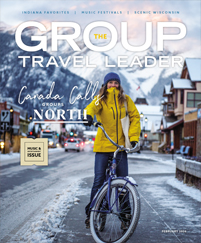Is travel capable of changing more than just your scenery?
On the surface, group travel is a straightforward proposition. People want to travel, and tour companies make their trips more convenient by bundling hotels, meals, transportation and sightseeing. Tour directors handle the logistics; local guides make faraway places feel safe and accessible. At the end of the trip, everyone goes home with souvenirs, photos and some fun memories.
Of course, all those elements are important parts of a group trip. But as society changes, tourism is changing with it. New generations are entering the marketplace, and they’re bringing new priorities, new anxieties and new expectations.
Among those new expectations is the often-unspoken hope that travel companies and tour providers will help their customers achieve some kind of personal transformation through their travel experiences. In other words, they’re looking for travel to change their lives.
But that’s not the only way in which the expectations around travel are changing. There is increasing scrutiny on the way tourists impact the communities they visit and a new emphasis on ensuring those impacts are positive. And in a world that seems to become more fractured by the day, a growing number of people are hoping travel can serve as a unifying force to hold society together.
To these people, a trip is not just a trip but a chance for change. It can change people. It can change destinations. And it can even change the world.
Travel, in other words, has enormous potential. But to a great degree, that potential is untapped.
Transaction vs. Transformation
It’s not that the travel industry doesn’t understand the power of travel. By and large, we do. But most travel professionals would be hard-pressed to describe how their products or services help change lives and make the world a better place. We’re absorbed with the day-to-day affairs of planning and selling travel and focused on all the transactions necessary to make business happen.
In the moments when we do contemplate the power of travel, we often assume that meaningful experiences will happen on their own. Maybe they will just materialize organically. Or perhaps someone else will facilitate those transcendent moments while we’re busy keeping the trains running on time.
For decades, this laissez-faire approach to travel’s potential has worked well enough. After all, the tourism industry worldwide has grown exponentially since the end of World War II. If this many people are traveling this often, doesn’t that mean they’re enjoying it?
Maybe. But I’m not convinced the tourism mindset that has worked in the past will continue to work in the future. The needs of people, of destinations and of society are changing, and they necessitate a new response from the travel community.
To meet those needs, we’ll have to do more than just plan, sell and lead trips. We need to tap into travel’s latent power. And that means, more than anything, changing the way we think. Because travel will only reach its true potential when we — the tourism industry — stop focusing on transactions and start focusing on transformations.
Changing Demands
Millennials and Gen Z come to travel with very different needs and expectations than baby boomers and Gen X do. And they’re beginning to look at tourism through a more critical lens.
Travel is expensive, and the costs continue to rise. People who don’t enjoy the economic security their parents and grandparents did see their travel dollars differently than previous generations. To them, it’s not spending — it’s an investment. And they expect a healthy return.
In addition to its financial costs, travel exacts an environmental toll. Tourism activity is a significant contributor to carbon emissions, and high levels of visitor traffic can jeopardize fragile ecosystems and cultures as well. This isn’t enough to cause most people to curb their travel habits, but it is making them think carefully about whether the benefits of their trips outweigh the costs.
Compounding all this are significant changes in people’s personal needs. Cultural emphasis on mental health and physical wellness have never been higher. And an epidemic of loneliness, anxiety and depression has led young travelers to look for more than just fun and value on their trips. They want travel to improve their mental health, restore their souls and help them build community.
A 2023 study by an organization called the Travel Coach Network paints this picture beautifully. (Travel coaching, by the way, is a recent development that heavily reflects millennial sensibilities: Travel coaches don’t plan or book trips, but they advise their clients on how they can make their travel more meaningful and impactful.) In the study, the organization asked its thousands of members around the country what their clients’ top motivations for travel are.
Among the answers were many responses you would expect — things like education, cultural enrichment and exploration. But alongside those came some surprising responses. For example, 4% of respondents said their customers travel for “soul healing and inner peace.” About 11% said their customers are traveling in search of “human connection.” And a full 17% reported that their travelers are venturing out in search of “personal development and transformation.”
Altogether, more than 40% of respondents said their travelers were looking for some kind of transformative, meaningful or impactful travel experience. Which means as many as four in 10 people coming on your trips are potentially bringing an unspoken expectation you may not be aware of — nor prepared to meet.
Think of it this way: If someone came on one of your trips and asked you to help them find soul healing and inner peace, how would you respond? Would you even know where to start?
Solving Travelers’ Problems
Of course, your customers aren’t likely to ask you for personal transformation in such direct terms. But increasingly, they are hoping you will facilitate that kind of experience for them, even if they don’t exactly say so.
Fortunately, fulfilling this desire may be easier than it first seems. A mountain of scientific research indicates travel can play a significant role in solving people’s problems. It can contribute to physical health, boost mental well-being, facilitate personal growth, and help people find a deeper sense of meaning and spiritual fulfillment.
Here’s the trick, though: These kinds of enriching experiences don’t occur automatically. They work best when a travel professional — someone like you — takes responsibility for making them happen.
A 2018 article published by a group of European social scientists in the International Journal of Environmental Research and Public Health demonstrated the importance of guided experiences for personal transformation. According to the paper, long-weekend trips were found to reduce “emotional and social strain, conflict, fatigue and lack of energy” for at least 45 days after travelers returned home — but only when travelers took part in restorative activities that were led by certified guides and coaches. Without those guided experiences, the positive impacts of travel dissipated after as little as three days.
It’s worth noting these guided experiences weren’t anything elaborate. According to the paper, over the course of a three-day trip, “participants had to partake in one session of moderate physical activity (Nordic walking, swimming) and one session of active recovery (yoga or Qui-Gong).”
Travel has the potential to address your customers’ inner problems. And you don’t need to be a mental health expert to help them.
Solving Destinations’ Problems
The movement toward a transformative travel industry shouldn’t be solely focused on solving travelers’ problems. It should aim to address destinations’ problems as well.
Travel can be enormously beneficial for destinations. But it isn’t always. This summer’s anti-tourism protests in Barcelona, as well as restrictive measures being considered in many other popular cities around the world, demonstrate the issues that can arrive from overtourism. And in other places, certain communities — especially those that are underprivileged and underrepresented — suffer from too little visitation.
Once again, research points to principles that can help leaders leverage tourism for good in their destinations. A 2023 study from Economist Impact found that tourism growth in major cities coincided with steep drops in unemployment and air pollution, increased employment and pay among women, and an uptick in overall economic growth.
But those benefits didn’t accrue evenly to destinations across the board. The researchers found that the positive outcomes were most evident in destinations that minimized what they called “economic leakage” — the tendency of tourism dollars to quickly flow to outside entities instead of staying in the local economy.
Destinations succeed with tourism when leaders inside and outside the community take responsibility for maximizing travel’s positive impacts. That means getting people to do business with locally owned hotels and restaurants, then working with those establishments to localize their supply chains. It also means encouraging hospitality organizations to hire from within underprivileged communities and creating pathways for those employees to build meaningful careers in tourism.
Whether you’re a destination professional or a travel planner, that’s a movement in which you can participate.
Solving Society’s Problems
Transformational travel addresses travelers’ problems. It addresses destinations’ problems. And believe it or not, it has a role in addressing society’s problems too.
This sounds like a tall order, I know, especially in an age when political divisions, racial tension and environmental issues seem to be straining the social fabric to its breaking point. But research and experience demonstrate that the mixing of people that happens through tourism could help ease social tension.
A 2008 paper in the European Journal of Social Psychology analyzed the results of dozens of academic studies done on interactions among groups of diverse backgrounds. The analysis found that in 94% of cases, intergroup experiences reduced prejudice by a significant amount.
That’s great news for travel, because it means we play a role in removing barriers and building bridges. But the way we do so matters. The study went on to say that “simply knowing more about [an] outgroup typically does not have a major effect on reducing prejudice “¦ Knowledge and empathy are generally unrelated.”
In other words, we can’t help travelers overcome social divisions by simply educating them. Taking them to a museum won’t work and neither will telling them about a people group as we drive past the place they live.
What will work: making a way for people of diverse backgrounds to spend meaningful time together.
“Contact eases cross-group anxiety,” the study found, “and this reduction in anxiety allows a concomitant reduction in prejudice.”
Transformational travel represents a paradigm shift for the tourism industry. In many ways, the movement is already underway. And though there may be some growing pains, the benefits far outweigh the costs.
As tourism professionals, we can help people find joy. We can help communities grow in meaningful ways. And we can help groups rediscover their shared humanity.
That’s a potential worth tapping into.












